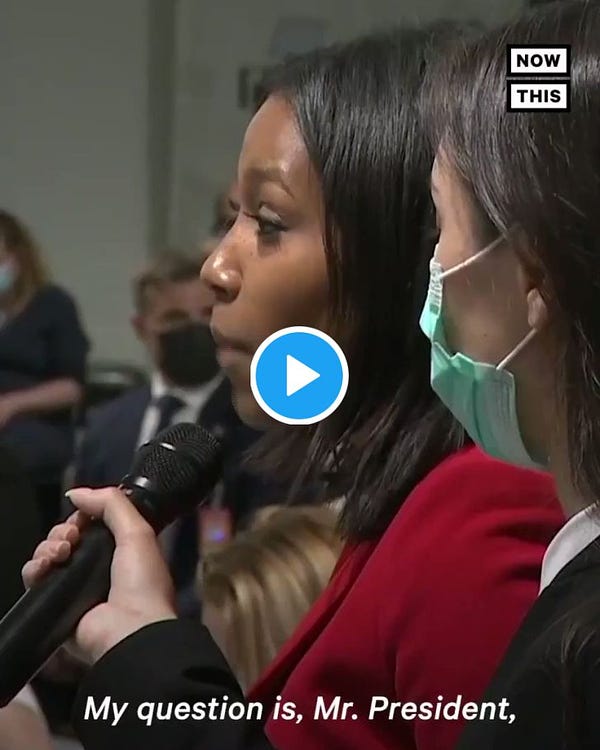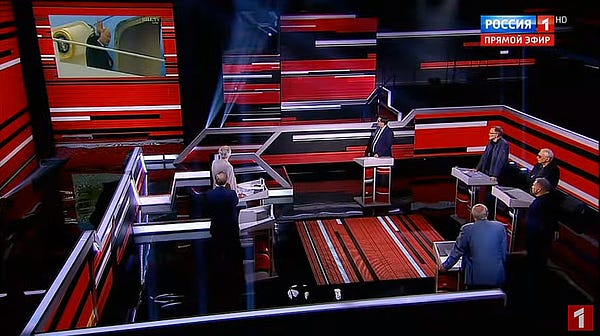OF ALL THE CANDIDATES who ran in the Democratic primary in 2020, the two that Vladimir Putin seemed to fear the most were Joe Biden and Kamala Harris. We can say this with confidence, because those were the two who bore the brunt of the Russian disinformation ops run during the campaign. And now that Biden and Harris are POTUS and MVP, the question becomes: Was Putin right to be afraid?
At Putin’s command, the Russian Federation has waged a virtual war on the United States. They have hacked into our networks. They have fucked with our elections. They have infiltrated our government, turning some of our Republican elected officials into founts of Kremlin disinformation: Donald John Trump, of course, but also Ron Johnson and the Fourth of July Traitors, Rand Paul, Lindsey Graham, Ted Cruz, Marco Rubio, and others, including former Congressman Dana Rohrabacher, House Speaker Kevin McCarthy, and every politician who perpetuated the Big Lie, or voted for the insurrection to not be investigated. Through their assets Edward Snowden and Julian Assange, they have also subverted the left. They have put cash-money bounties on the heads of our soldiers. They have committed political assassinations in allied countries. They have attacked our embassies with strange, sonic-attack weapons. And just as the Taliban gave cover to Al Qaeda, Putin’s Russia gives cover to the most powerful mobsters in the world: sex traffickers, arms dealers, drug dealers, professional killers, and so on.
Furthermore, Putin’s Russia invaded the sovereign nation of Ukraine, a key U.S. ally, and continues its illegal occupation of the Crimea. This took place after Ukraine willingly surrendered its nuclear weapons in 1994, in exchange for a promise that Western nations would defend it from its despotic neighbor to the north. Past administrations of both political parties have looked at Russia through rose-colored glasses, hoping to “reset” with Putin, not understanding that this was akin to Neville Chamberlain declaring “peace in our time” after Munich.
Vladimir Putin bears blame for exacerbating the extreme divisions in our country—divisions sown by his noxious propaganda. He wants us sick, which is why his operatives push the antivax disinformation. He wants us shooting each other, which is why he had his buddy Alexander Torshin infiltrate the NRA, which has obdurately refused all common-sense gun control reform. He wants us fighting each other, which is why his networks poke at the “wedge issues” that divide us, especially race—if we are focused inward, we cannot lead the free world. And he wants us isolated, which is why he delighted in Trump’s sabotage of NATO.
So it was with great interest that I observed the first meeting between Joe Biden and Vladimir Putin last Wednesday in Geneva. Did Joe really understand the Russian President, in a way that escaped Trump, Obama, and Bush II? Was he going to let the little twerp play him, as he’d played his predecessors? Or was he going to take him to the fucking woodshed?
There were some who felt like Biden should not have given Putin the courtesy of a face-to-face meeting, as such meetings only serve to benefit the Russian strongman’s propaganda machine. That this was the prevailing opinion of Soviet-born dissidents gives the opinion extra weight.
“When Mr. Biden was elected, I hoped he would learn from painful recent lessons and carve out a more muscular policy toward Moscow than his two feeble predecessors did,” political activist and chess master Garry Kasparov wrote in an op-ed, a week before Geneva. “I condemned the idea of a summit between the leader of the free world and the dictator of a terrorist mafia state.” As Kasparov sees it, the United States had little if anything to gain from such a summit, while Putin benefited greatly. “Without real elections, a dictator’s authority comes from his grip on power—military, internal security and economic. A summit with the U.S. president sends a message that no matter how bad things are in Russia, no matter how many sanctions the West applies, Mr. Putin is still boss.”
After the summit concluded, Kasparov’s position had not much changed. “The only good news about the meeting, the summit, was that it was shorter than expected, so there was not much damage done,” he said. “It’s not about words, it’s about actions, and you don’t meet with thieves who robbed your house in Geneva. Biden undermined America’s European allies and gave Putin a top seat at the table.”
In appraising the summit, my friend, the activist Zarina Zabrisky, was more blunt. “I will not comment on yet another Western favor to a mafia state,” she tweeted the day after Geneva. “The next logical step left is just bending over. Since we consistently fail to use our brains we probably deserved being [fucked] over by a small KGB crook. It is a bitter day for the world. Shameful, really.”
The American-Canadian columnist Diane Francis, fiercely anti-Putin, wrote, ahead of Geneva, that “the very notion of a summit—initiated by Biden—was foolish in the first place.” She continued:
Putin never negotiates. He never concedes. He kills and conquers without hesitation. He’s not held back by alliances that hold conflicting viewpoints or have conflicts of interest. He never changes.
He has no interest in winning or reaching an agreement. Vladimir Putin’s goal is to restore the Soviet Union and to destroy the United States, the European Union, democracy, and capitalism, not necessarily in that order.”
Her view had not changed when what she termed the “Geneva Nothingburger” was over: “This summit was another ballyhooed event that boosted [Putin’s] image, television ratings, and unfortunately will fail to change minds or the course of history.”
And Victor Rud, the foreign policy commentator who has been banging the drum for decades about America’s failure to properly understand the role of Ukraine vis à vis Russia, correctly points out that the administration of Joe Biden, like that of Trump, Obama, Bush, Clinton, and so on, continues to misplay its hand in Kyiv. Not including Ukraine’s president in the NATO meeting, he argues, or having him meet with Biden prior to Geneva, was a tactical mistake. “Putin sees the deferred White House summer meeting with the Ukrainian President, coupled with a $150 million assistance package”—paltry and inadequate, Rud notes, next to the $40 billion we’re spending in Afghanistan in 2021, even as we withdraw our troops—“timed days before Geneva, as another failure of will. How much this year for Afghanistan as America pulls out? Who is America’s ambassador in Kyiv? What’s the message?”
For me, I would rather that Biden not have granted Putin such a useful photo op. But there are good reasons to meet the guy—namely, to sit him down and tell him right to his over-Botoxed face what Tupac Shakur told Mobb Deep: “You better back the fuck up before you get smacked the fuck up.” Messages of that nature are most effectively delivered in person.
And reading between the lines, I wonder if maybe, just maybe, that’s what went down in Geneva. The meeting, as Kasparov noted, was short. There was no joint press conference afterward—Biden refused to allow it. There was no asinine move to “reset,” no talk of knowing Putin by gazing into his murine eyes, and, obviously, no secret tryst where the translator’s notes were subsequently confiscated. In his press conference following the summit, President Biden wasn’t Uncle Fluffy. His snippiness at the dumb question asked by the CNN reporter was emblematic of his overall mood. He was pissed.
In his remarks after the Putin sit-down, Biden seemed to address Kasparov and others who thought the summit should not have taken place: “I know there were a lot of hype around this meeting, but it’s pretty straightforward to me—the meeting. One, there is no substitute, as those of you who have covered me for a while know, for a face-to-face dialogue between leaders. None.”
Biden hinted at our incredible power in the online arena, suggesting that a threat had been made to respond in a way that the venal Putin would not enjoy: “When I talked about the pipeline that cyber hit for $5 million—that ransomware hit in the United States—I looked at him and I said, ‘Well, how would you feel if ransomware took on the pipelines from your oil fields?’ He said it would matter.” That’s a statesmanlike way of saying, “Nice oil pipeline you got there. Be a shame if something were to happen to it.”
For all the headlines made by Russian hacking groups, the fact is, the United States invented cyberspace. We could totally shut the whole miserable country down if we so chose. And Putin knows it. But Trump was never going to allow that. Neither was Obama. Putin needs to believe that Biden would.
Ukraine was also addressed in the remarks, suggesting that Biden, perhaps, understands what his predecessors—and, probably, his own Secretary of State—does not. “I communicated the United States’ unwavering commitment to the sovereignty and territorial integrity of Ukraine.” Mere words, yes, but perhaps indicative of a president who will not appease a dictator.
Biden also brought up Alexei Navalny, the Russian opposition leader who is being tortured and starved in prison there. The gist was that very bad things would happen to Putin if Navalny were to die.
Most important, Biden was circumspect about the meeting. He didn’t make any grand promises. He didn’t declare “peace in our time.” He said, “We’ll find out within the next six months to a year whether or not we actually have a strategic dialogue that matters.” That sounds to me like a timeline was given for Putin to make some concessions…or else. Joe also made it clear that he wasn’t confident that Putin would heel.
On the Russian side, Putin appeared fidgety, uncomfortable, and out of sorts. Most of the media happily gave him softball questions, but he was subjected to some inquiries that Russian reporters would get killed for asking, such as this one from ABC’s Rachel Scott:


In the lead-up to Geneva, Russian TV had been depicting Biden as old, feeble-minded, senile, weak. Tellingly, that narrative abruptly stopped as soon as the meeting took place. Even the great Russian propaganda machine couldn’t sell that lie, as Julia Davis points out:


Instead, Putin went into full ass-kiss mode.
What does it mean? For now, not much. As the President said, we won’t know for another six months to a year what, if anything, Geneva accomplished. Combined with the rest of his European trip, however, the summit was a qualified success for Joe Biden. Just how successful remains to be seen.
New sanctions are coming, this time for the Navalny poisoning. Actions speak louder than words—especially to a congenital liar like Putin. Let’s hope Biden went “Hit ‘Em Up” on the Russian president, warning him, as Tupac once warned Biggie and the Bad Boy crew: “You about to feel the wrath of a menace.”
Photo credit: The Kremlin’s photo of the summit. This is the best they could get Putin to look, and the worst they could get Biden to look. Putin still looks uncomfortable, and Biden still looks in command.





I always sooo appreciate your "optimistic" view of what I might call the "dismal state of our world", Greg Olear. Thank you. Thank you.
Hi Greg. Thank you for this analysis. You'll be pleased to know that Yuri Shvets pretty much agrees with you. He now has his own YouTube channel, where he posts videos analyzing the current situation, albeit only in Russian.
In yesterday's interview on another channel called Rashkin Report, Yuri said that he sees Russia barrelling towards its existential end as a state and maybe people in the White House see it as well and don't want to interfere. Left to themselves, they will simply self-destruct the way USSR self-destructed 30 years ago.